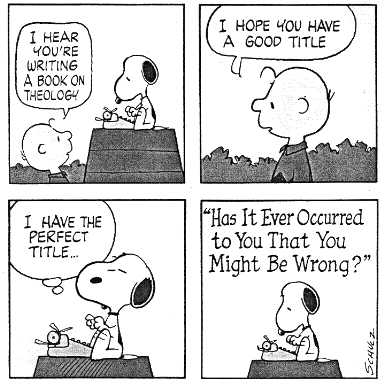
*Capitan’s log, star date: I don’t really give a a flying borg’s eye…*
If you were to take two people with two differing theologies , put them in a discussion on a differing belief and you stripped down what they were saying, it might go something a little like this,
“No, you’re wrong. You’re wrong because this verse says so” Said Person One.
“Actually, I’m right because that verse doesn’t mean what you say it does, it means something else” replied person two.
Person one looks puzzled and shouts “What? No, that verse can’t possibly mean that! It has to mean this because this other verse says this, and that confirms what I’ve been saying all along!”
*rinse…repeat…sometimes for hours*
I’m sure we’ve all heard or read or been in a conversation like this before. And it is always interesting how one theology interprets everything to fit in a certain “grid”, so that when someone else suggests one of those pieces should change its position, the first theology shouts about how that can’t be so because it doesn’t fit properly in their “grid”. But seldom some wonder whether or not part of their grid (or perhaps the whole thing) may be incorrect. And this is to be expected, since such a question is quite daunting and uncomfortable, but what happens is this: What could be a potential learning process becomes more of a war of the doctrines. It is a war in which no one ever really wins (just YouTube a controversial video dealing with religion, and you will see what I’m talking about). Hence, to some degree I’ve lost interest in the topic, or at least debating it with any vigor or desire to show others that I’m right.
You think I'm wrong? Well, cool...but I just dont really care. I'm more than willing to hear you out on why you think I'm mistaken, but at the end of the day, who really knows who's right? I mean, in all genuine honesty, how? The problem with everyone is that they think they've arrived at the highest form of truth (or at least somewhere in the ballpark of it), when there's absolutely no way to prove what the highest form of truth is. In fact, not only is it something you cannot prove, but your opposition probably thinks they have the highest form of truth as well.
Everybody’s enlightened…everybody’s saved…and everybody is lucky enough to be the chosen ones. Or so everybody thinks, at least.
I mean once upon a time I loved theology. In some way I still do love it, but not so much in the sense of trying to pin point every right belief about God and the Bible. This, I would say, is mostly because no matter how much you study (the Bible, the Christianities, etc), all the conclusions you come to are merely assumptions. That’s it…assumptions. Assumptions based on other assumptions. Some of those assumptions might be more historical or traditional than others, but they are usually based in no more objective evidence than the next assumption. And then we feel inclined to take those assumptions and spend loads of time trying to beat the differing assumptions out of someone else. It's all rather pointless, and usually not that loving either.This is also why I waste absolutely no time in calling people “heretics” or “false teachers” just because they disagree with what I think is true. I mean, between the velvet lies, there may be a truth that’s hard as steel, but that doesn’t make it any more obvious in a world where God seemingly made it impossible to prove such things, does it? Do I really need to call you a name or judge your character or relationship with God, just because you believe differently than me? And do you really have to brand me as “out of your club”, just because my ideas didn’t get the highest votes among some old stuffy men in Rome, over a thousand years ago? I think it’s just better to accept our differences, and share ideas when and where civility isn’t going to be an issue.
So what do we do? How do we determine the “right” theology? Is that even possible? No, I don’t really think so. Yet, I think one can get an ‘A’ for effort, if they are at least trying to determine what is most true about God and spiritual realities. All we can do is make the best assumptions that we possibly can. After all, we don’t have any other choice but to abandon the search all together and be content with an existence only in-tune to the physical and provable dimension (which some do). Yet some of us still have a hunch that there is still some very real truths to be uncovered (even if only partially) within this spiritual quest we find ourselves in.
So, we must push forward and continue to test the fruits and test the spirits, as I mentioned in my last blog.


